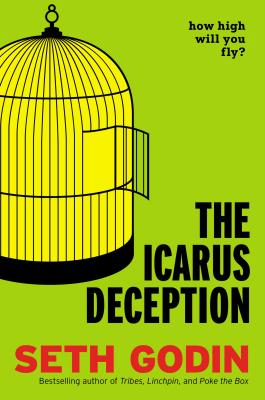Jack Covert Selects - The Icarus Deception
December 14, 2012
The Icarus Deception: How High Will You Fly? by Seth Godin, Portfolio, 256 pages, $24. 95, Hardcover, December 2012, ISBN 9781591846079 Most of us remember the “creative types” in school, the ones who wore odd clothes and listened to strange music.
The Icarus Deception: How High Will You Fly? by Seth Godin, Portfolio, 256 pages, $24.95, Hardcover, December 2012, ISBN 9781591846079
Most of us remember the “creative types” in school, the ones who wore odd clothes and listened to strange music. Fast-forward and we now find ourselves in a position that requires us to be creative, to solve problems, to invent new things and ways of doing things, to inspire people, and more. But since we viewed that ability as belonging to a particular social group for most of our lives, we think we lack it.
Seth Godin’s new book, The Icarus Deception: How High Will You Fly? tells us that we’ve been mislead. Just as the mythical character Icarus was told not to fly too close to the sun or too close to the ground, we have been encouraged to stay in the middle, to be comfortable, to trust in and rely on the systems that have instructed us. But that system and the comfort zone it provided is now deteriorating around us—everything we learned is wrong. The good news, according to Godin, is that once we realize this, we can change.
Think about the last meeting you attended, when the moderator asked “Does Anyone Have Any Suggestions?” Godin sets the scene:
Silence. Sidelong glances, perhaps some shuffling of papers, but still, silence. Really?
All these highly trained, well-paid, and respected people in a room and not one person has something to contribute? I doubt it.
Stick around for a few minutes, and if the moderator has earned any trust at all, someone speaks up. And if that person isn’t summarily executed, someone else speaks up. And then more people. Until finally, the room is filled with energy, a buzz that you can feel. Finally, we’re permitted to be human, to end the silence, to share our best work.
Amazingly, everyone in the room is capable of seeing and analyzing and solving. Everyone in the room is capable of passion. Everyone in the room can care enough to do something—if they can overthrow the self-induced, systemically amplified censor that keeps them in line. We all have ideas and intelligence and passion, we just need to allow ourselves to stand up and speak out. The Industrial Age and its factories required quiet productivity and standardization, and the people who worked in those factories were certainly no exception. The Industrial Age is over.
We live in a different time now, which Godin calls “the connection economy.” Connections involve people, but they also involve ideas, and as we make connections we create rather than replicate. Whether we’re flight attendants, sales people, wait staff, managers, or painters, we can all make connections. We can all make art.
Many books on creativity and innovation look at how to think differently, and this book certainly does that. The difference here is how Godin analyzes why we think the way we do, what our fears are, and identifies what is blocking our creativity. All the brainstorming in the world won’t create new ideas when those generating them won’t fly too high for fear of burning their wings. Unlike Icarus, our wings won’t get burned. It’s time to fly higher, and as usual, Godin leads us there.



